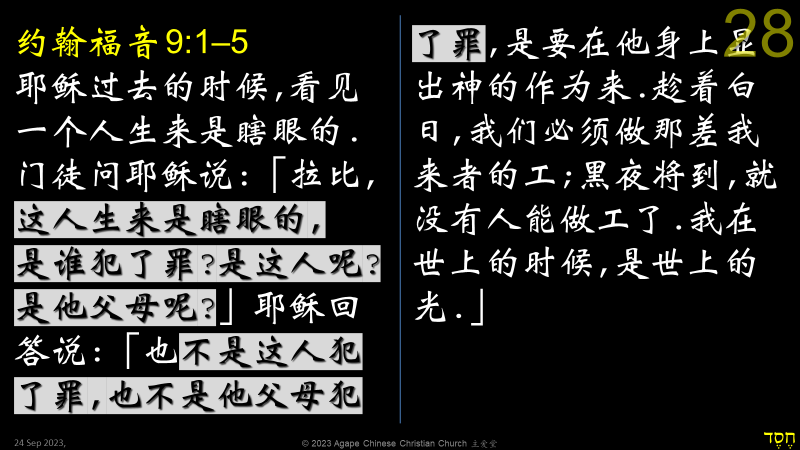Update: 230925 22:39 The title was changed to from “Pray for each other” to “Confess sins to each other.” This reflects the last-minute decision to share only up to 5:16a. We’ll continue the rest in Oct.
Title: 要彼此认罪 Confess sins to each other
Passage: James 雅各书 5:15b–16a
News & Prayers
Sermons on Book of James Since March 2022
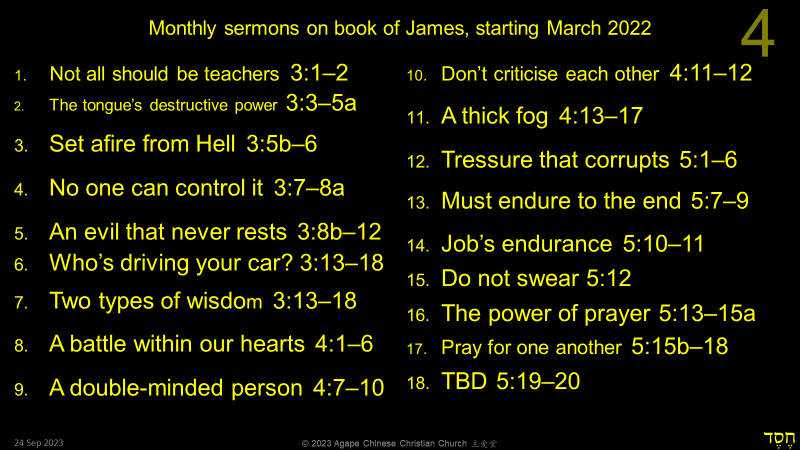
These are all the sermons I shared on the book of James. This started when brother Wang Hao Mu said he’ll stop giving sermons because of health reasons, so I took over from him. He was at the end of James 2 when I took over.
Today we’re at James sermon series #17: Pray for One Another
Hook
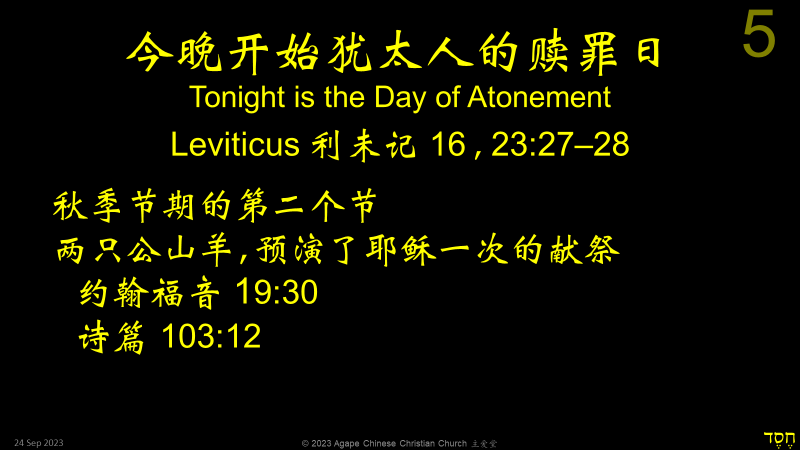
Day of Atonement
Day of Atonement (Hebrew: Yom Kippur). You can read about the Feasts of YHWH in Leviticus 23.
Day of Atonement is 2nd of 3 autumn feasts (Lev 23:27–28).
Part of the feast is to present two male goats to the Lord. The first goat is sacrificed and its blood sprinkled on the atonement lid (the cover of the Ark of the Covenant, inside of which are the Ten Commandments). The second goat is sent off into the wilderness, symbolically carrying all the sins of Israel far away from the people (Psalm 103:12).
Why do we care about all this today?
Preview of How Jesus Saves Us
The yearly Festivals of the Lord are previews of God’s salvation plan.
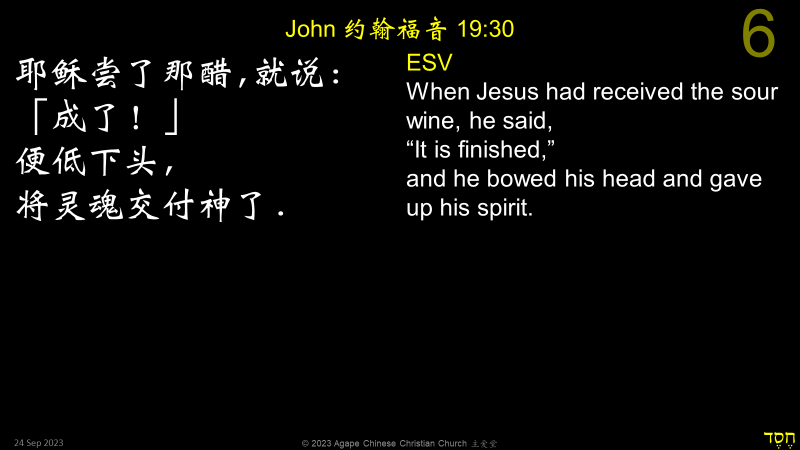
God’s plan of salvation is finished when Jesus died for our sins.
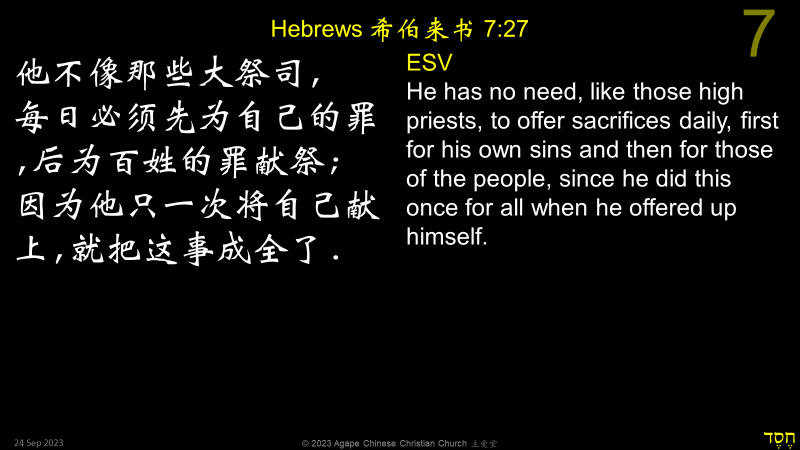

Jesus made the “once for all” sacrifice when he died, so there’s no longer any need to make sacrifices year after year (John 19:30; Heb 7:27; Heb 10:14).

His blood covers our sins (just like the goat’s blood covers the Ten Commandments). His sacrifice of himself appeased God’s wrath (like the symbolic act of sprinkling the goat’s blood on the atonement lid), and also atoned for our sins by removing our sins from us (Psalm 103:12), just like with the second goat.
Jesus completed all the requirements of atoning for our sins.
Review
Review of last month’s sermon on James (James 5:13–15)

Prayer of faith can heal
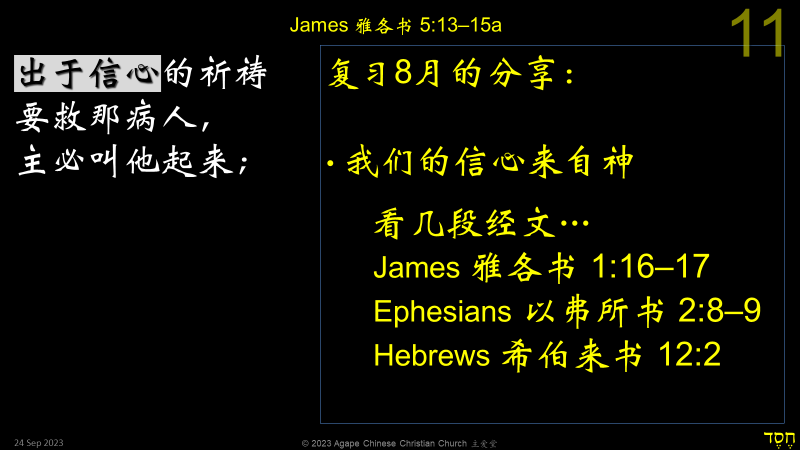
James 5:15 a
And the prayer of faith will save the one who is sick, and the Lord will raise him up.
“The prayer of faith” can save the sick person. Note this “save” is not about salvation, but about being healed of the illness.
Our faith is a gift of God
A few things about this “prayer of faith”:
- Our faith, our ability to believe, is a grace of God (as in Jas 1:16. Also Eph 2:8–9; Heb 12:2)
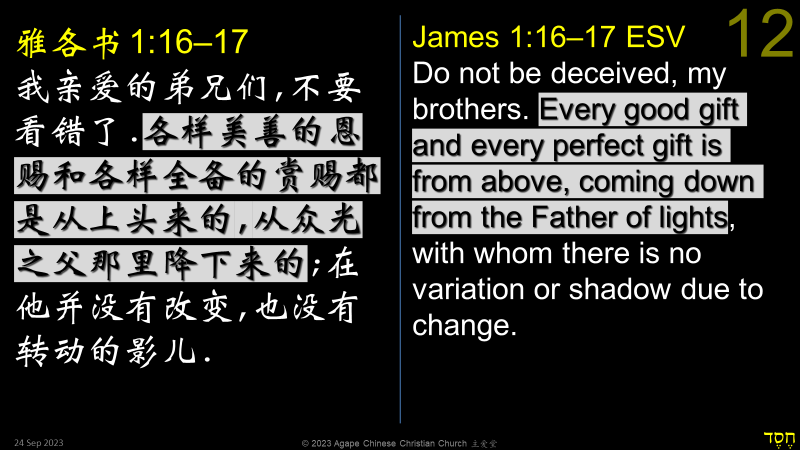

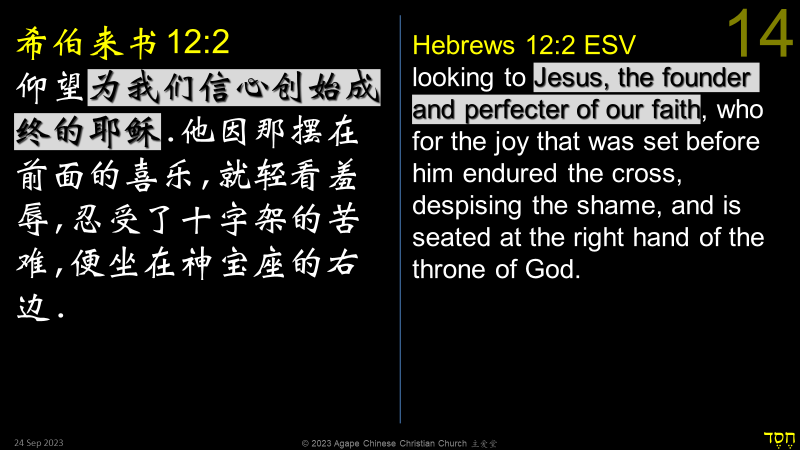
How we pray or how often, etc., are not important
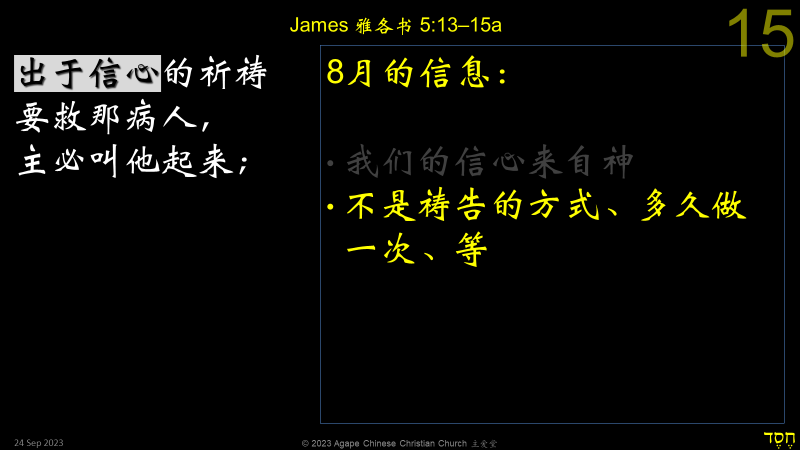
- It’s not about the manner in which we pray, or how often, or that we repeat certain phrases or words, etc. We pray in faith, trusting that God will listen, and the he will give us an answer that is according to his will
- We pray for God to hear us, not for the people around us to hear how well we pray
Prayer must be according to God’s will

- This kind of prayer is according to God’s will. I.e., we have a good idea of what God likes and dislikes, and we pray accordingly
Example of praying to God’s will

- Remember also what Daniel’s 3 friends prayed in Dan 3:17–18?
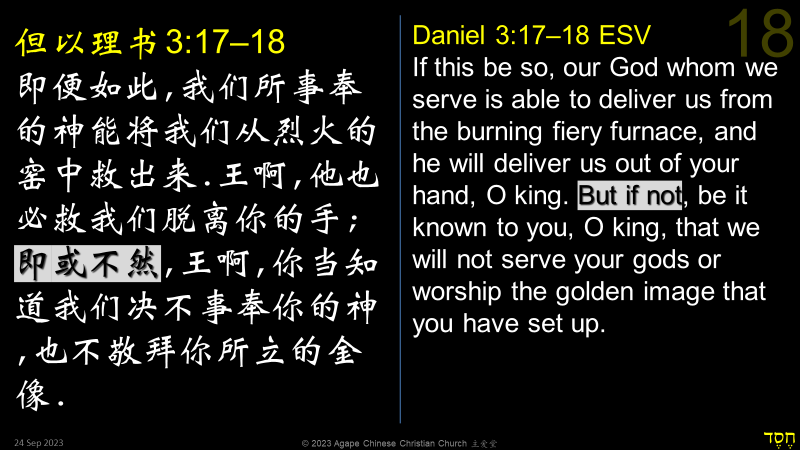
即或不然 Jí huò bùrán Even if it is not the case
- They prayed for deliverance, but they also know that it’s up to God to decide whether to deliver them or not. So they added the phrase “But if not…”
Lessons

We learn 3 lessons from v. 15a:
- Our faith is a gift of God, not because we work hard at it or can train for it.
- It’s not about how we pray, or how often, etc.
- Our prayers must be according to God’s will.
Today’s Sermon
Hook
<Slide-20>
Admit mistakes, apologise
Easy to do? Difficult?
Why?
Today’s Passage
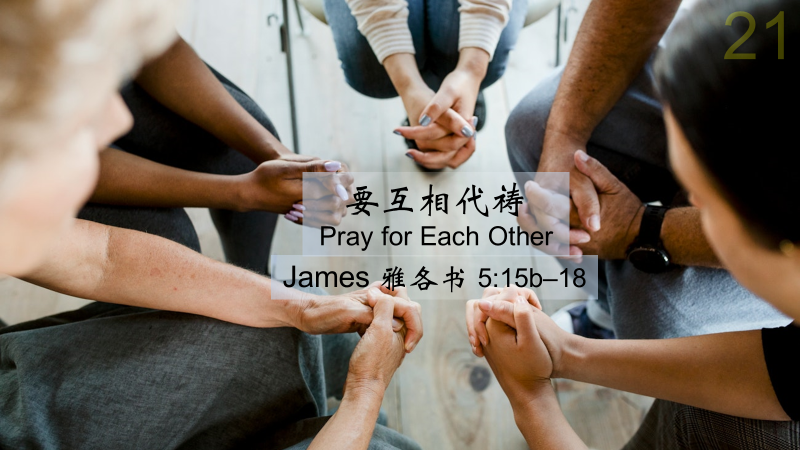
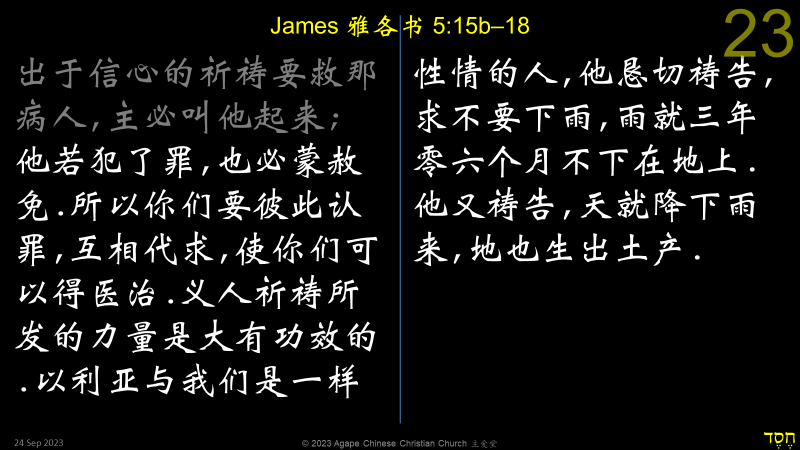
And if he has committed sins, he will be forgiven. Therefore, confess your sins to one another and pray for one another, that you may be healed. The prayer of a righteous person has great power as it is working. Elijah was a man with a nature like ours, and he prayed fervently that it might not rain, and for three years and six months it did not rain on the earth. Then he prayed again, and heaven gave rain, and the earth bore its fruit.
John 5:15–18 ESV

Outline

Had a bit of conflict:
- The entire passage starting at 5:13 is about prayer, but different topics within the overall topic of prayer
- There are really 3 main topics in 15b–18, mutual confession, mutual prayers, and the power of righteous person’s prayer
- I usually share only 1 main topic per sermon
- But, don’t want to drag things out too long
- We’ll see how far we get after the 1st main topic. If it’s too long, we’ll just stop there
Section 1 罪蒙赦免 Sins will be forgiven
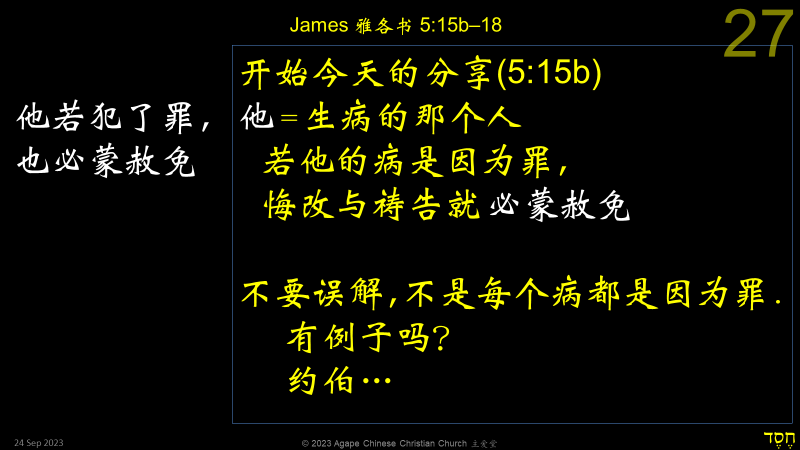
And if he has committed sins, he will be forgiven.
James 5:15b
We now start today’s passage (starts in 5:15b).
This is continuation of last month’s sermon: Have illness, call for elders to pray, the Lord will “raise him up.”
This “raise him up” (from James 5:15a) is probably meant to sound like resurrection, but it’s about healing of the illness.
“He” here refers to the person who was sick (last month’s passage about praying for the sick). It applies equally to man or woman.
If her illness was caused by sin, then after repentance and prayer, her sins will be forgiven.
But don’t get the wrong idea. Not every illness is caused by sin.
Can you think of any good examples of illness not caused by sin?
Read MoreLessons (Section 1)
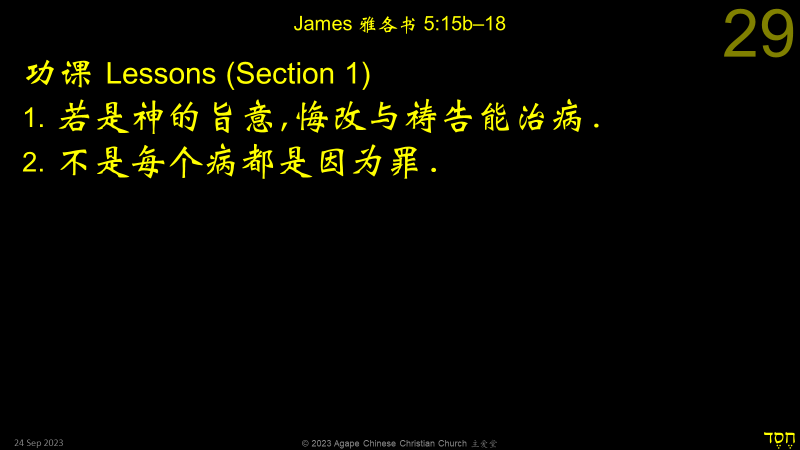
- If it’s God’s will, then repentance and prayer will lead to healing (could be physical or spiritual, or both).
- Not every illness is caused by sin.
Section 2 要彼此认罪 Confess sins to each other
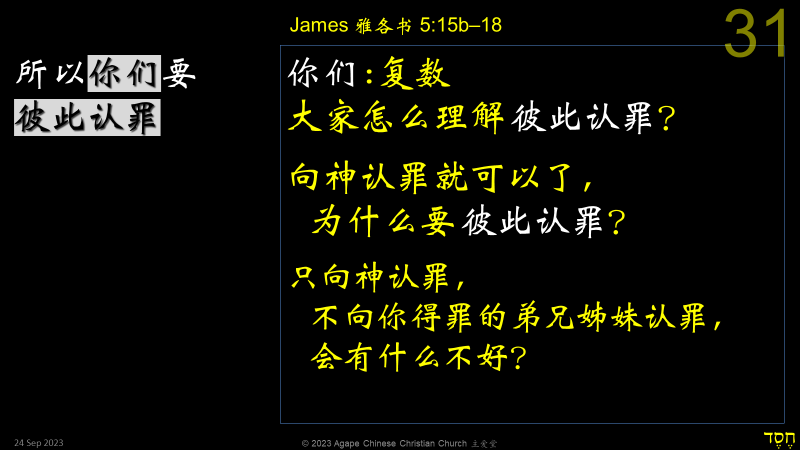
Therefore, confess your sins to one another
John 5:16 a
你们 is plural. CUV (Chinese Union Version, the standard Chinese Bible used by 99.9% of Chinese congregations the world over) is better than English translations for this part. English doesn’t distinguish between singular “you” and plural “you”.
How do you understand “confess your sins to one another”?
Isn’t it enough to confess to God? Why confess to each other?
What are some problems with confessing just to God, and not to the brother or sister you wronged?
Several points to remember
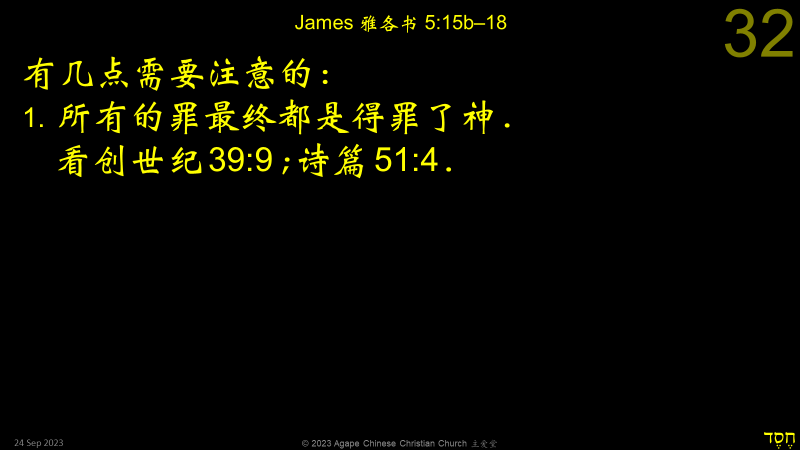
All sin is ultimately against God
Because any sin is ultimately against God, we won’t mention it explicitly for now. Just don’t forget that this is always the first thing: confess to God.
Both Joseph and David understood this fact:
- Joseph and the saga with Potiphar’s wife is in Gen 39
- David and Bathsheba’s story is in 2 Samuel 11
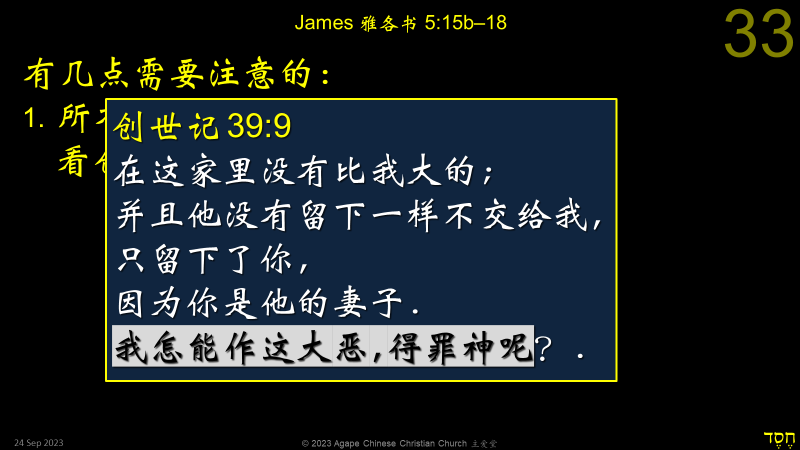
He is not greater in this house than I am, nor has he kept back anything from me except you, because you are his wife. How then can I do this great wickedness and sin against God?”
Genesis 39:9 ESV
Notice that Joseph didn’t say wickedness against his master Potiphar, or even against Potiphar’s wife, but the sin will be against God. Joseph and the saga with Potiphar’s wife is in Genesis 39.

Against you, you only, have I sinned
Psalm 51:4 ESV
and done what is evil in your sight,
so that you may be justified in your words
and blameless in your judgment.
This was written by David after he was confronted with his adultery with Bathsheba. David and Bathsheba’s story is in 2 Samuel 11. He coveted (seeing Bathsheba bathing on the rooftop), had sex with another man’s wife (adultery), lied, murdered (had Bathsheba’s husband killed), etc.

2. What if we confess only to God?
a. Not only must we confess to God (because all sin is ultimately against God).
b. But we must confess to each other (the person we wronged). Both Jesus and James gave the same teaching. See Matthew 5:23–24

Matthew 5:23–24 So if you are offering your gift at the altar and there remember that your brother has something against you, leave your gift there before the altar and go. First be reconciled to your brother, and then come and offer your gift.
Note that Jesus sees reconciling with the person we wronged to be more important than worship.
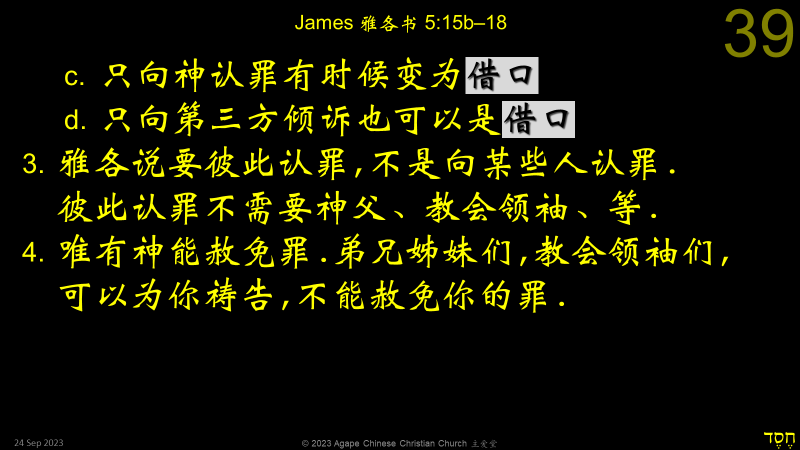
倾诉 qīngsù Complain, or confide in
c. Confessing only to God can be a form of excuse
d. Confiding and Confessing to a third party only can also be an excuse
3. Note that James said to confess to each other, not to some particular people like a priest, or church leader, etc. We need to confess to the person(s) we wronged.
4. Only God can forgive sins. A brother or sister, or a church leader, can hear your sin and pray for you, but they cannot forgive your sin.
These last two points are very much against what we see in the Roman Catholic church. Roman Catholics need to confess to a priest (instead of to God), and the priest can give them forgiveness. These concepts are very unbiblical.
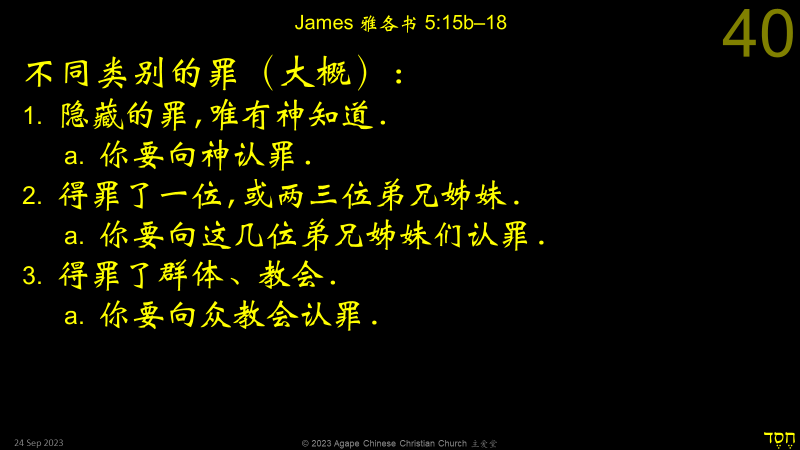
Rough categories of sins
类别 lèibié Categories, types
Different types of sin (a very rough classification):
- Hidden sin that only God knows about
- You should confess to God
- If it makes you feel better, you can also confide in a close friend or a spiritually mature brother or sister
- You sinned against one, or a few, brother/sister
- Confess to God (always the 1st step)
- You need to confess to these few people you wronged
- There’s no need to let the whole church know about it
- Again, if it makes you feel better, you can also confide in a close friend or spiritually mature brother/sister
- A sin against the whole fellowship or church
- Confess to God (always the 1st step)
- You also need to confess to the whole fellowship or church
James is probably talking about the last type, because restoring peace in the church is a main point in the book of James.
Lessons (Section 2)
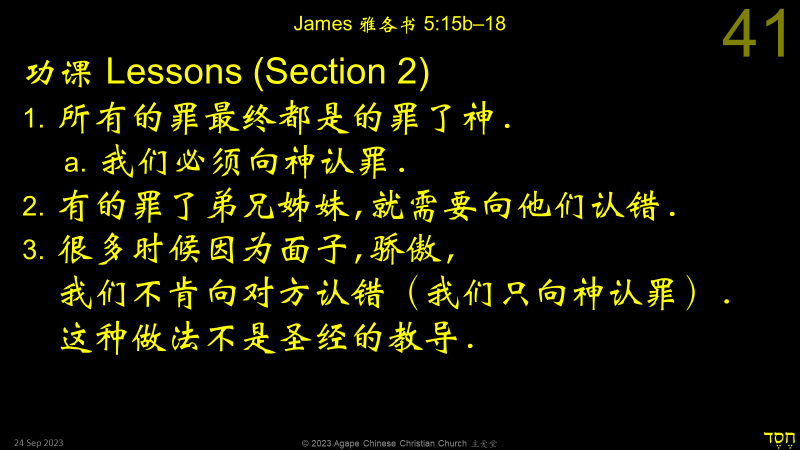
- All sin is ultimately against God
- We must always confess to God
- If we wronged a brother/sister, we need to also admit our wrong and reconcile with our brother/sister
- Quite often, because we want to save face, because of pride, we won’t reconcile with the person we wronged (maybe we confess only to God). This is not biblical way of doing things.
Do you have any sins that you need to confess?
Have you reconciled with your brother/sister?

